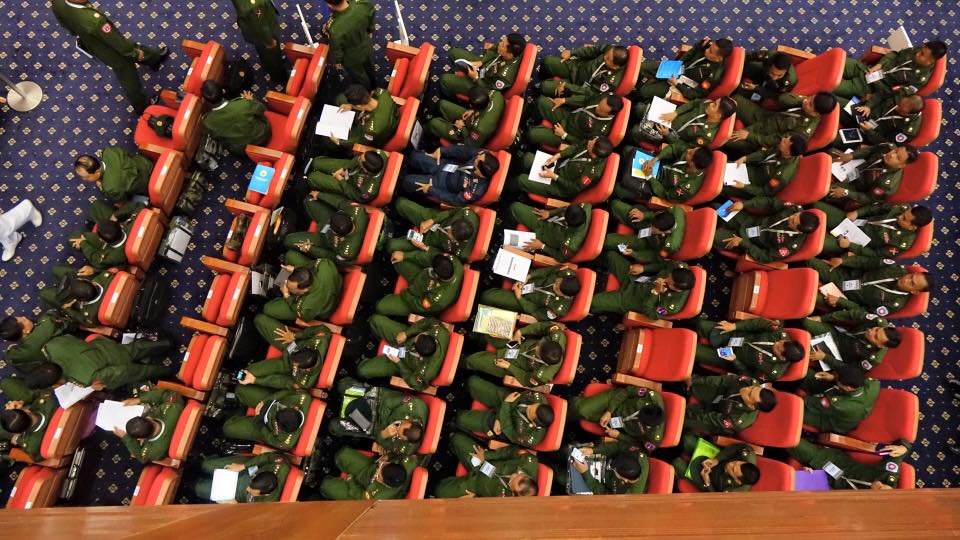The Burmese military said it will work with Aung San Suu Kyi’s incoming government when it takes over the country’s peace process.
Friday saw the fourth day of the Union Peace Conference in Naypyidaw, a gathering of 700 delegates from Burma’s military, ethnic armed organisations and political parties. The summit comes as the second step in Burma’s lurching peace process, begun by the outgoing Thein Sein administration in 2012.
The incumbent Union Solidarity and Development Party, which has presided over five years of top-down economic and political reform in Burma, is regarded as a military proxy party. The group of ex-generals will vacate their governmental positions in March, making way for Aung San Suu Kyi’s National League for Democracy, which has vowed to hasten democratisation in Burma.
However, the ability for Suu Kyi’s party to guide a politically-autonomous Burmese army through the next stages of a tense peace process remains one of the significant questions on the eve of a new era for the former pariah state.
On Friday, speaking to DVB on the sidelines of the historic talks, the Burmese army’s Gen. Tin Maung Win said the Tatmadaw was ready and willing to cooperate with Suu Kyi in the continuation of the peace process.
“Regardless of who becomes the government, I believe the next government will continue the effort to successfully implement peace. The Tatmadaw will continue to cooperate with any government to bring about peace with utmost dedication,” the army spokesperson said.
Suu Kyi made a brief appearance on the first day of the current ‘political dialogue’ which was mandated by the signing of the Nationwide Ceasefire Agreement by the Burmese army and eight rebel groups in October.
“We cannot not build sustainable peace without reconciliation. I am now ready to implement the duty to build eternal peace based on the mandate given by the citizen nationalities of the country,” Suu Kyi said on Tuesday.
Analysts observed that her surprise commitment to the first day of the event may spur ceasefire-recalcitrant rebel groups to come back to the negotiating table. Of the 16 groups that pre-drafted the ceasefire document, only seven signed. The Shan State Army-South became the eighth, after it signed the accord without having participated in its drafting.
For the armies that did sign and are present at the Naypyidaw summit as it moves into its fifth and final scheduled day on Saturday, the question of what to do with their sizeable active forces is perhaps the trickiest issue.
Security sector reform is treated by Naypyidaw as the process of the disarmament, demobilisation and reintegration of ethnic armies. Those ethnic armies see the process as the creation of a federal or union army, in which control would be shared.
The Tatmadaw says it maintains its stated and constitutionally protected right to exist as Burma’s ‘sole patriotic defence force.’
“In any country, there is only one military and we too are working to achieve a single [unified] Tatmadaw, a standard army for our country,” Gen. Tin Maung Win said on Friday.
[related]
“In our history, we lost our independence due to a lack of ethnic unity and the lack of a modernised army. To make sure that doesn’t happen again, we have been shaping the Tatmadaw since we regained independence into a strong, efficient, modernised and patriotic standard army – the single Tatmadaw.”
The unwillingness of rebel armies to lay down their arms however may prove an intractable topic of talks to come, talks that Suu Kyi says will only begin in earnest when she takes the helm.
Rebel signatories to October’s ceasefire hope that lengthy talks will result in a compromise by Burma’s powerful army.
“We need negotiations to integrate ethnic armed forces into the [Burmese army]. According to the Nationwide Ceasefire Agreement, security sector reform is only to be implemented after reaching a political accord so it will depend on the outcome of political dialogue,” said Myo Win, the deputy chair of the All Burma Democratic Students Front.
“One thing we are sure of is that it will take us time to systematically reform the country’s security sector. It took us two years to reach the ceasefire agreement and this too will also take us time for negotiations.”



